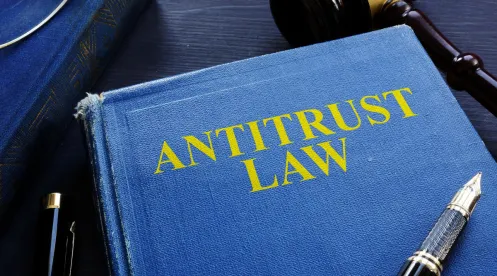Nearly seven years after first announcing its intent to criminally prosecute employers and individuals for anticompetitive conduct in labor markets, the Department of Justice Antitrust Division (DOJ or Division) voluntarily dismissed its last remaining criminal prosecution for alleged “no-poach” agreements, seemingly marking the end of the Division’s four-year odyssey to secure a criminal conviction for conduct related to labor competition.
In a court filing last month, the Division offered no explanation for its decision to voluntarily dismiss with prejudice its indictment against Surgical Care Affiliates, LLC (SCA) and SCAI Holdings, LLC, which the DOJ filed in January 2021 as its first-ever criminal action predicated on an “unlawful employee allocation agreement,” or an agreement not to “poach” or “solicit” the employees of a labor market competitor.1 Though the Division refused to comment on the dismissal, the decision follows a series of defeats suffered by the government in its effort to prosecute individuals and employers involved in alleged wage-fixing and no-poaching agreements.
Notwithstanding the recent setbacks DOJ has encountered, government regulation—both at the federal and state level—of competition in the labor markets is likely to continue for the foreseeable future.
In this alert, we take a look back at DOJ’s and the Federal Trade Commission’s (FTC) (collectively, Agencies) attention toward labor market competition over the past several years, including the Division’s prosecution record since first bringing no-poach and wage-fixing criminal cases in 2021. We then provide an overview of the current landscape of state and federal government enforcement in this area. Finally, we provide practical guidance for all companies that compete for employees to help avoid running afoul of the antitrust laws.
2016-2020, A LOOK BACK: ANTITRUST ENFORCERS INCREASE THEIR ATTENTION TOWARD LABOR MARKET COMPETITION
While the Division and the FTC had decades of experience regulating no-poach and wage-fixing agreements in various industries (including technology, health care, aerospace, transport, etc.), the Agencies historically limited their regulation to civil enforcement actions. That changed in October 2016 when the Agencies issued their Antitrust Guidance for Human Resource Professionals, marking a significant policy shift toward the intent to criminally prosecute employers and individuals who entered into an “agreement among competing employers to limit or fix the terms of employment for potential hires...[that] constrains individual firm decision-making with regard to wages, salaries, benefits; terms of employment; or even job opportunities.”2
In the following years, the Division and its leaders regularly made statements3 affirming its new enforcement priority, gave remarks clarifying how DOJ intended to criminally prosecute labor market agreements, and repeatedly warned companies of such a threat while signaling that the Division was building criminal cases for alleged no-poach agreements.
At the same time, various state enforcers and the FTC turned their attention to the competitive effects of noncompete clauses and other employment restrictions: In 2016, Illinois filed a lawsuit against a fast-food restaurant for “imposing highly restrictive non-compete agreements on all its employees”; in 2018, Washington launched a “Worker Protection Initiative,” through which the attorney general litigated to eliminate no-poach clauses in franchise agreements as well as the use of noncompete agreements by a Seattle-area coffee chain that prevented employees from working at any competing coffee shop in all of northwest Washington; and in 2019, a coalition of state attorneys general urged the FTC to ban the use of noncompete clauses nationally, leading the FTC to hold a public workshop in early 2020 to examine whether it should promulgate a rule to restrict such clauses in employer-employee employment contracts.
THE ANTITRUST DIVISION’S CRIMINAL ENFORCEMENT RECORD IN LABOR MARKET PROSECUTIONS
The Division brought its first-ever criminal charges for alleged anticompetitive conduct in labor markets in late 2020. As summarized in the case chronology below, what followed was three years of mixed results—with certain victories balanced against significant litigation defeats. For example, the Division secured an important victory in United States v. DaVita, where a Colorado federal judge ruled that the government’s “no-poach” allegation was a type of horizontal market allocation, and thus should be viewed legally as a per se, or automatic, violation of the antitrust laws if proven.4 Likewise, In United States v. Hee, the Division secured a guilty plea and a pretrial diversion agreement against a company and its former manager, respectively, for wage fixing. However, these prosecutorial victories have been overshadowed by the Division’s failure to convince a jury that the no-poach or wage-fixing conduct alleged in any of the cases below was enough to criminally convict a defendant of anticompetitive conduct. Most notable was the government’s loss in United States v. Patel, where a Connecticut federal judge refused to send the case to the jury and instead granted defendants’ Rule 29 motion for acquittal, finding that no reasonable juror could have viewed the Division’s evidence as constituting the essential elements of a crime.
United States v. Jindal, et al., Case No. 20-cr-358 (E.D. Tex. 2020)
- Allegation (Wage Fixing): In December 2020, the Division indicted the owner and former clinical director of a physical therapist staffing company for allegedly conspiring with a competitor to fix the wages they paid physical therapists.
- Outcome: In April 2022, the jury acquitted both defendants of anticompetitive conduct, but convicted one defendant of obstructing the DOJ’s investigation, resulting in a sentence of probation.
United States v. Surgical Care Affiliates LLC, et al., Case No. 21-cr-00011 (N.D. Tex. 2021)
- Allegation (No-Poach): In January 2021, the Division indicted SCA, an operator of outpatient surgical facilities around the country, for an alleged seven-year conspiracy among competitors not to solicit each other’s senior-level employees.
- Outcome: In November 2023, the Division voluntarily dismissed the indictment.
United States v. Hee, et al., Case No. 21-cr-00098 (D. Nev. 2021)
- Allegation (Wage Fixing & No-Poach): In March 2021, the Division indicted a health care staffing company that provided nurses for a public school district in Nevada, and its former manager, for allegedly agreeing with another contractor to not raise wages or hire nurses from each other.
- Outcome: In October 2022, the company entered into a plea agreement with the Division and was sentenced to pay a criminal fine of $60,000 and restitution of $72,000 to nurses affected by its conduct. In January 2023, the former manager entered into a pretrial diversion agreement with the Division, committing to performing 180 hours of community service while holding a job, surrendering his passport, and avoiding additional legal troubles, in order to avoid jail time. These agreements marked the Division’s first successful prosecution of criminal charges in a labor-side antitrust case.
United States v. DaVita Inc., et al., Case No. 21-cr-00229 (D. Colo. 2021)
- Allegation (No-Poach): In July 2021, the Division indicted DaVita and its former CEO of conspiring with SCA and other operators of outpatient surgical facilities around the country for an alleged seven-year conspiracy among competitors not to solicit each other’s senior-level employees.
- Outcome: In April 2022, after a nearly two-week trial, the jury acquitted all defendants on all charges.
United States v. Patel, et al., Case No. 21-cr-00220 (D. Conn. 2021)
- Allegation (No-Poach): In December 2021, the Division indicted six aerospace and staffing company executives for an alleged decade-long no-poach conspiracy related to the employment of aerospace engineers.
- Outcome: In April 2023, in the Division’s most notable setback to date, the Court ordered the acquittal of all defendants before the case even went to the jury, holding that the evidence did not support a reasonable jury concluding that there was an agreement to meaningfully allocate the labor market for engineers.
United States v. Manahe, et al., Case No. 22-cr-00013 (D. Me. 2022)
- Allegation (Wage Fixing): In January 2022, the Division indicted the operators of four Portland, Maine, home health care agencies, alleging a wage-fixing conspiracy to avoid competing with each other for workers during the pandemic.
- Outcome: In March 2023, after a two-week trial, the jury acquitted all defendants on all charges.
United States v. Lopez, Case No. 23-cr-00055 (D. Nev. 2023)
- Allegation (Wage Fixing): In March 2023, the Division indicted a health care staffing executive alleging he conspired with others to fix the wages of Las Vegas nurses at home health agencies.
- Outcome: Case pending.
While the outcome in the majority of these seven cases favored defendants, the Division has not, in any manner, repealed its policy of viewing no-poach and wage-fixing agreements as criminal conduct. Thus, the risk of criminal investigation and prosecution by the Division for no-poach and wage-fixing agreements by labor-market competitors remains.
ONGOING GOVERNMENT ENFORCEMENT POLICIES AND ACTIONS RELATED TO LABOR MARKET COMPETITION AND CORRESPONDING PRIVATE PLAINTIFF CIVIL ACTIONS
Indeed, the Division remains “very focused on labor-related issues,” including competition issues related to “wages, non-competes, no-poach agreements, [health care company initiatives] to see more patients over less time, [and] other workplace restrictions or conditions.”6 The same is true for other public and private enforcers of US antitrust laws, including the FTC, private civil plaintiffs, and state attorneys general.
Continuing its years-long scrutiny of how the use of noncompete agreements impact workers, the FTC continues to focus on labor market competition issues. In January 2023, the FTC proposed a sweeping ban on employee noncompete clauses. While this proposed rule has not yet taken effect, the FTC has actively imposed noncompete restrictions in its regulatory actions over the past year.7 Likewise, the FTC and the Department of Labor recently announced that they had signed a memorandum of understanding outlining “the ways in which the FTC and DOL will work together” on issues affecting workers, including “labor market concentration, one-sided contract terms, and labor developments in the ‘gig economy.’”8 The MOU identified labor market areas of “mutual interest” for the two agencies, including, as examples: (1) collusive behavior; (2) the imposition of one-sided and restrictive contract provisions, such as noncompete and training repayment agreement provisions; (3) the extent and impact of concentration in labor markets; and (4) the impact of algorithmic decision-making on workers.
Given the lower burden of proof in civil actions, the antitrust plaintiffs’ bar, too, remains focused on filing private actions for treble damages against companies for alleged no-poach and wage-fixing agreements. Over the last decade and a half, cases have been filed against companies in at least the following industries: technology,9 animation,10 higher education,11 fast food,12 railway,13 poultry processing,14 automatic service,15 tax,16 health care,17 aerospace,18 luxury brands,19 and shipbuilders.20 The majority of these cases have resulted in years of costly litigation, often resolved by large settlements paid by the defendants.
Likewise, state attorneys general remain focused on regulating labor markets in their respective states. For example, in a lawsuit brought by the Illinois attorney general against staffing agencies alleging they agreed to refrain from hiring each other’s workers and to suppress wages, the Illinois attorney general recently argued before the Illinois Supreme Court that the state’s antitrust law includes labor services within the law’s coverage.21 In New York, the New York attorney general was joined by 19 other states in filing an amicus brief before the Second Circuit, arguing that the court should reverse a district court’s decision to throw out civil no-poach allegations against various luxury brand manufacturers.22 The New York attorney general also settled allegations of no-poach allegations with leading title insurance companies in New York.23 Illinois and New York are not the only state attorneys general actively investigating and prosecuting labor market competition; the last few years have seen various states—including, but not limited to, New Jersey,24 Washington,25 Ohio,26 California,27 and the District of Columbia28—initiate investigations and bring regulatory actions to limit “no-poach” and other labor market competition policies in their states.
Relatedly, both the DOJ and FTC remain focused on labor market competition in connection with the Agencies’ regulation of mergers. Historically, the labor market implications of mergers have generally been ignored.29 However, since the start of the Biden administration, the Agencies have sought to strengthen their Merger Guidelines to take into consideration how proposed mergers may impact the labor market(s) at issue. In early 2022, the Agencies launched a joint public inquiry soliciting input on ways to “modernize federal merger guidelines to better detect and prevent illegal, anticompetitive deals in today’s modern markets,” including “how the guidelines should analyze labor market effects of mergers,” specifically with respect to buyer power.30 Earlier this year, the Agencies released a draft update of their merger guidelines,31 which for the first time included a proposed section on whether a merger “may substantially lessen competition for workers” where a merger “involves competing buyers.”32 In these draft guidelines, the Agencies express concern regarding whether a merger might “lower wages or slow wage growth, worsen benefits or working conditions, or result in other degradation of workplace quality.”33 On December 18, 2023, the Agencies released the final version of the Merger Guidelines, dedicating a large portion of Guideline 10 to the impact a merger is likely to have on workers in the relevant labor market. While these changes remain in draft form and are not final, it is unlikely that the Agencies will abandon their newfound focus on labor market considerations in the merger context.34
PRACTICAL GUIDANCE FOR COMPANIES
Companies and their human resources departments hiring and retaining employees are well-advised to familiarize themselves with key best practices for minimizing risk exposure, including:
- Training executives and key individuals involved in recruitment to be sensitized to the antitrust risks of entering into employment-related agreements and information exchanges of any employment-related information.
- Proactively auditing existing employment agreements to flag potential risk areas, which will likely depend on the relevant market and operating jurisdictions.
- Evaluating how the company is accessing information or setting its employees’ salaries and terms and whether such wages and restrictions are appropriate.
- Avoid discussing or entering into agreements with other employers not to recruit certain employees or not to compete on salaries or any other form of compensation. Ensure that potentially justified nonsolicitation or noncompete clauses in agreements such as mergers and acquisition (M&A) documentation, joint ventures, distribution, staffing agency contracts, or franchise agreements are reviewed by antitrust counsel before being agreed upon.
- Avoid sharing information with competing employers about your terms and conditions of employment except where approved by counsel and with appropriate protocols in place. A key area where this can come up in practice is in the context of M&A due diligence, where it will be necessary to redact employee identities and salaries or set up a clean team to handle review of those disclosures (to avoid anti-competitive disclosures in case the deal does not progress). Employers should also be mindful of the risk of inadvertently exchanging detailed competitive information through conduits such as external recruitment agents. Whilst some transparency is a natural part of a competitive job market, and may be required under certain jurisdictions’ pay transparency laws, regular or detailed exchanges that lead to firms not competing on their employment terms are likely to raise concerns.
FOOTNOTES
1 See ECF 203, United States’ Motion to Dismiss, United States v. Surgical Care Affiliates LLC, et al., Case No. 3:21-cr-00011 (N.D. Tex. Nov. 13, 2023).
2 Department of Justice Antitrust Division & Federal Trade Commission, Antitrust Guidance for Human Resource Professionals (Oct. 20, 2016), https://www.justice.gov/atr/file/903511/download (Antitrust Guidance).
3 See, e.g., Press Release, “Statement of Assistant Attorney General Makan Delrahim Before the Senate Subcommittee on Antitrust, Competition Policy and Consumer Rights,” UNITED STATES DEPARTMENT OF JUSTICE ANTITRUST DIVISION, (Oct. 3, 2018), https://www.justice.gov/opa/pr/statement-assistant-attorney-general-makan-delrahim-senate-subcommittee-antitrust-competition (reminding the business community that no-poach and wage-fixing agreements can be prosecuted as criminal violations when they are not reasonably necessary to a separate, legitimate transaction or collaboration between employers.).
4 See Order Denying Defendants’ Motion to Dismiss, United States v. DaVita Inc., et al., Case No. 21-cr-00229 (D. Colo. Jan. 28, 2022), ECF 132.
5 See Ruling and Order on Defendants’ Motions for Judgment of Acquittal, United States v. Patel, et al., Case No. 21-cr-220 (D. Conn. Apr. 28, 2023).
6 Deputy Assistant Attorney General Andrew J. Forman Delivers Remarks to Capitol Forum: Health Care Competition Conference, UNITED STATES DEPARTMENT OF JUSTICE ANTITRUST DIVISION (Oct. 26, 2023), https://www.justice.gov/opa/speech/deputy-assistant-attorney-general-andrew-j-forman-delivers-remarks-capitol-forum-health.
7 See, e.g., “FTC Approves Final Order Requiring Anchor Glass Container Corp. to Drop Noncompete Restrictions That It Imposed on Workers,” Federal Trade Commission (June 2, 2023), https://www.ftc.gov/news-events/news/press-releases/2023/06/ftc-approves-final-order-requiring-anchor-glass-container-corp-drop-noncompete-restrictions-it.
8 Press Release, “FTC, Department of Labor Partner to Protect Workers from Anticompetitive, Unfair, and Deceptive Practices,” FEDERAL TRADE COMMISSION (Sept. 21, 2023), https://www.ftc.gov/news-events/news/press-releases/2023/09/ftc-department-labor-partner-protect-workers-anticompetitive-unfair-deceptive-practices.
9 In re High-Tech Employee Antitrust Litigation, Case No. 11-cv-2509 (N.D. Cal. 2011); Frost et al v. LG Corp., et al., Case No. 16-cv-05206 (N.D. Cal. 2016); Deserae Ryan et al. v. Microsoft Corp., Case No. 14-cv-04634 (N.D. Cal. 2014).
10In re Animation Workers Antitrust Litigation, Case No. 14-cv-4062 (N.D. Cal. 2014).
11 Seaman v. Duke University, et al., Case No. 15-cv-00462 (M.D.N.C. 2015).
12 Deslandes v. McDonald's USA, LLC et al., Case No. 17-cv-04857 (N.D. Ill. 2017); Butler v. Jimmy John's Franchise, LLC et al., Case No. 18-cv-00133 (S.D. Ill. 2018).
13In re Ry. Indus. Emp. No-Poach Antitrust Litig., Case No. 18-cv-789, MDL. No. 2850 (W.D. Pa. 2018).
14 Jien et al v. Perdue Farms, Inc. et al., Case No. 19-cv-2521 (D. Md. 2019).
15Fuentes v. Jiffy Lube International, Inc., Case No. 18-cv-05174 (E.D. Pa. 2018).
16 Robinson v. Jackson Hewwit, Inc., et al., Case No. 19-cv-09066 (D.N.J. 2019).
17In re Outpatient Medical Center Employee Antitrust Litigation, Case No. 21-cv-00305 (N.D. Ill. 2021); In re Geisinger System Services and Evangelical Community Hospital Healthcare Workers Antitrust Litigation, Case No. 21-cv-00196 (M.D. Pa. 2021).
18 Borozny et al. v. RTX Corporation, Pratt & Whitney Division, et al., Case No. 21-cv-01657 (D. Conn. 2021).
19 Beachum v. Saks Incorporated, et al., Case No. 20-cv-01769 (E.D.N.Y. 2020).
20 Scharpf et al. v. General Dynamics Corp., et al., Case No. 23-cv-01372 (E.D. Va. 2023).
21 The State of Illinois v. Elite Staffing Inc. et al., Case No. 2020-CH-05156 (Circuit Court of Cook County 2020).
22 Giordano v. Saks Incorporated, Case. No. 23-600 (2d Cir. 2023).
23 Press Release, “Attorney General James Ends Harmful Labor Practices at Top Title Insurance Companies,” NEW YORK STATE ATTORNEY GENERAL (July 25, 2023), https://ag.ny.gov/press-release/2022/attorney-general-james-ends-harmful-labor-practices-top-title-insurance-companies.
24 “AG Platkin: No-Poach Agreements Are Presumptively Illegal,” NEW JERSEY ATTORNEY GENERAL’S OFFICE (Oct. 23, 2023), https://www.njoag.gov/ag-platkin-no-poach-agreements-are-presumptively-illegal/.
25 “AG Ferguson’s initiative to end no-poach clauses nationwide continues with seven additional chains.” WASHINGTON STATE OFFICE OF THE ATTORNEY GENERAL (Dec. 20, 2018), https://www.atg.wa.gov/news/news-releases/ag-ferguson-s-initiative-end-no-poach-clauses-nationwide-continues-seven.
26 “Competition Matters: Fast-Food Chains Agree to Remove No-Poach Agreements,” OHIO ATTORNEY GENERAL (Jan. 2, 2020), https://www.ohioattorneygeneral.gov/Media/Newsletters/Competition-Matters/January-2020/Fast-Food-Chains-Agree-to-Remove-No-Poach-Agreemen.
27 Press Release, “Attorney General Becerra Announces Multistate Settlements Targeting “No-Poach” Policies that Harm Workers,” CALIFORNIA OFFICE OF THE ATTORNEY GENERAL (Mar. 12, 2019), https://oag.ca.gov/news/press-releases/attorney-general-becerra-announces-multistate-settlements-targeting-%E2%80%9Cno-poach%E2%80%9D.
28 “AG Racine Announces Four Fast Food Chains To End Use Of No-Poach Agreements,” OFFICE OF THE ATTORNEY GENERAL FOR THE DISTRICT OF COLUMBIA (Mar. 13, 2019), https://oag.dc.gov/release/ag-racine-leads-coalition-18-ags-urging-regulators.
29 See Berger, David W. and Hasenzagl, Thomas and Herkenhoff, Kyle and Mongey, Simon and Posner, Eric A., Merger Guidelines for the Labor Market (April 2023). NBER Working Paper No. w31147, SSRN: https://ssrn.com/abstract=4420562.
30 Press Release, “Federal Trade Commission and Justice Department Seek to Strengthen Enforcement Against Illegal Mergers,” FEDERAL TRADE COMMISSION (Jan. 18, 2022),https://www.ftc.gov/news-events/news/press-releases/2022/01/federal-trade-commission-justice-department-seek-strengthen-enforcement-against-illegal-mergers.
31 FTC-DOJ Merger Guidelines (Draft for Public Comment) (July 19, 2023), https://www.ftc.gov/legal-library/browse/ftc-doj-merger-guidelines-draft-public-comment.
32 Id. at § 11.
33 Id.
34 Merger Guidelines, UNITED STATES DEPARTMENT OF JUSTICE AND THE FEDERAL TRADE COMMISSION, Dec. 18, 2023, 2023 Merger Guidelines.pdf (justice.gov)






 />i
/>i

